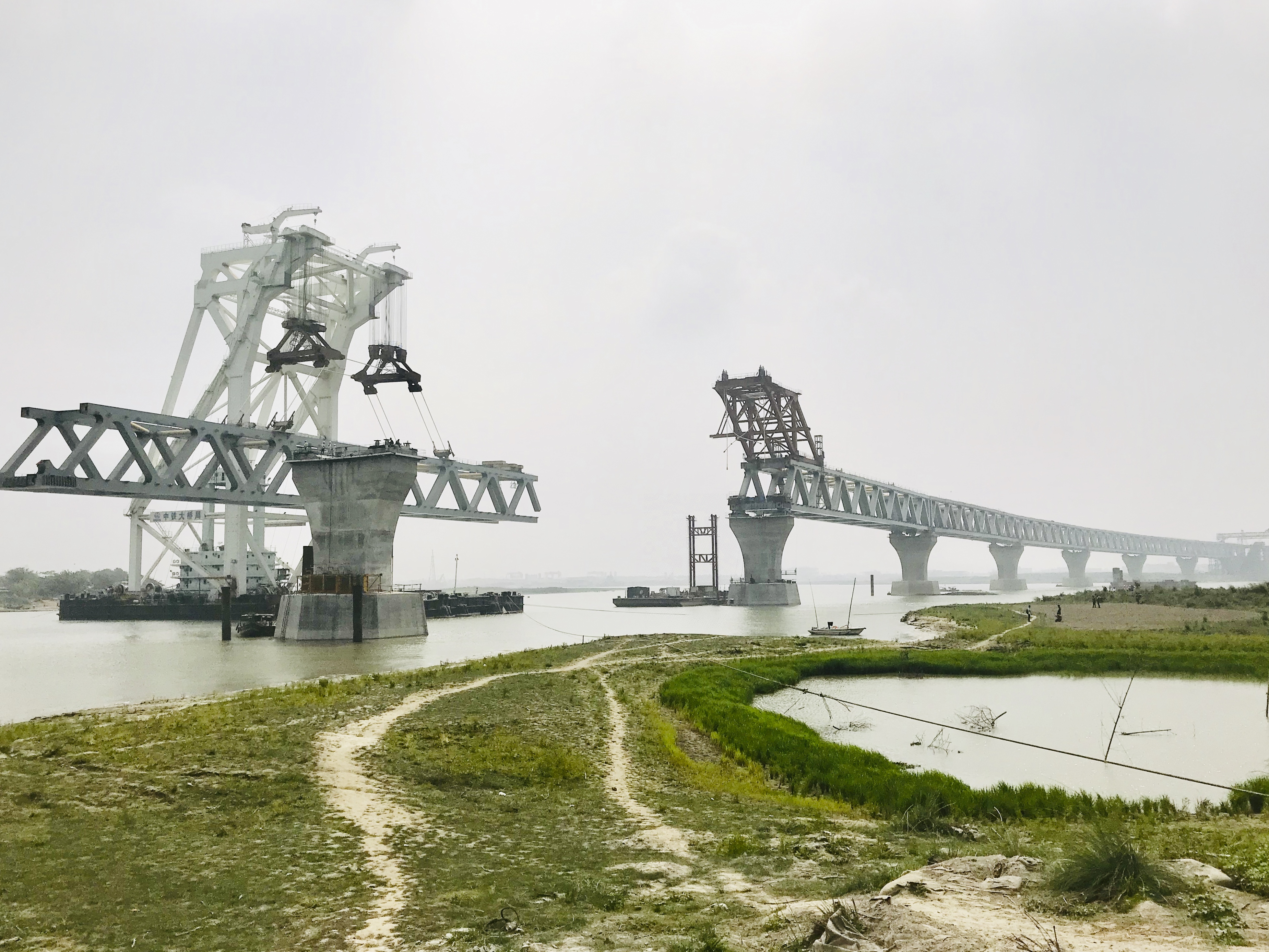
A 3,140-ton span is placed on pillars of the Padma Bridge by a China-made crane vessel in Bangladesh Feb. 20, 2019. (Photo: Xinhua)
Apart from being a strategic partner of China, Bangladesh is an important participant of the Belt and Road Initiative (BRI) in South Asia. The country's geographic location has increased its strategic significance and relevance to the initiative, as Bangladesh can serve as a bridge between South and Southeast Asia. Keeping this potential in mind, Bangladesh joined the BRI in 2016 and has since been reaping enormous dividends from the initiative.
Thanks to the BRI, Bangladesh has witnessed substantial investments in its infrastructure sector, which has been pushing its economy ahead. As a result, Bangladesh is now among the three fastest-growing economies in the world. The economy of the South Asian nation is projected to grow at 7.3% this year, the second-highest in the world and one of only three countries in the world expected to log more than 7% growth this year, according to the International Monetary Fund.
The World Bank, meanwhile, said 7.3% growth would make Bangladesh among the five fastest-growing economies in the world this fiscal year, and the Asian Development Bank also tipped Bangladesh to achieve the fastest economic growth in the Asia-Pacific region at 8% in the 2019-20 fiscal year.
Such steady and remarkable achievements, owing in no small part to the active role and contributions of the BRI, have put Bangladesh on the path to fulfilling its dream of becoming a developed country by 2041. However, to realize the dream, economists have said the country will have to raise its annual GDP growth rate to more than 8% in the coming years, which means making huge progress in exports, remittance of foreign income or gains, and job creation. And the only path to this change is attracting vast inflow of infrastructure investment.
According to the Asian Infrastructure Investment Bank, Bangladesh requires investments of more than US$24 billion in its infrastructure sector each year to continue on its journey to become a member of the club of developed nations. The power sector is an essential component of the infrastructure, and the country would require about US$35 billion in total investments in that sector alone by 2041.
In order to carry its dream forward, Bangladesh expects more and wider investment inflows from China under the BRI cooperation. From the Chinese side, it's high time to invest in a country that maintains a secure and profitable investment environment thanks to its high degree of political stability. The Bangladeshi government has also taken some pragmatic initiatives to allure foreign investment, including the introduction of one-stop service, streamlining of rules and regulations, and setting up special economic zones. For investors, these zones also come with a wide range of measures like tax holidays and citizenship. Moreover, a total of 700 acres of land has been allocated for Chinese investors in particular to establish an economic zone in southern Chittagong, the nation's commercial capital.

Photo taken on Sept. 10, 2018 shows the assembling site of a shield tunneling machine in Chattogram, Bangladesh. China's largest shield tunneling machine for export, 12.12 meters in diameter and weighing 2,200 tonnes, has been used for opening a 3,500-meter road tunnel under Karnaphuli River. [Photo/Xinhua]
China has the potential to invest further in the gas, oil and energy sectors of Bangladesh. Chinese entrepreneurs can also invest in tourism, river dredging, automobiles, agriculture and irrigation, as well as building airports, highways and railways. They can benefit from investments in many other growing sectors as well, such as IT, ship-building, agro-based industries, leather and leather products, pharmaceuticals, ceramics, frozen fish, plastics, furniture, home textiles, and jute and jute products.
Against such a backdrop of rich potential, a high-level state delegation from Bangladesh joined the much-awaited second Belt and Road Forum in Beijing this week. The forum is expected to work out a detailed plan for the advancement of BRI cooperation among participating countries in the coming years.
In 2016, China and Bangladesh signed deals totaling more than US$21 billion in investment in the latter. And now, as an important partner in the BRI, Bangladesh is expecting more of the same good news of substantial investments from China.
(Md Enamul Hassan is the diplomatic correspondent with the Daily Sun, Bangladesh.)


